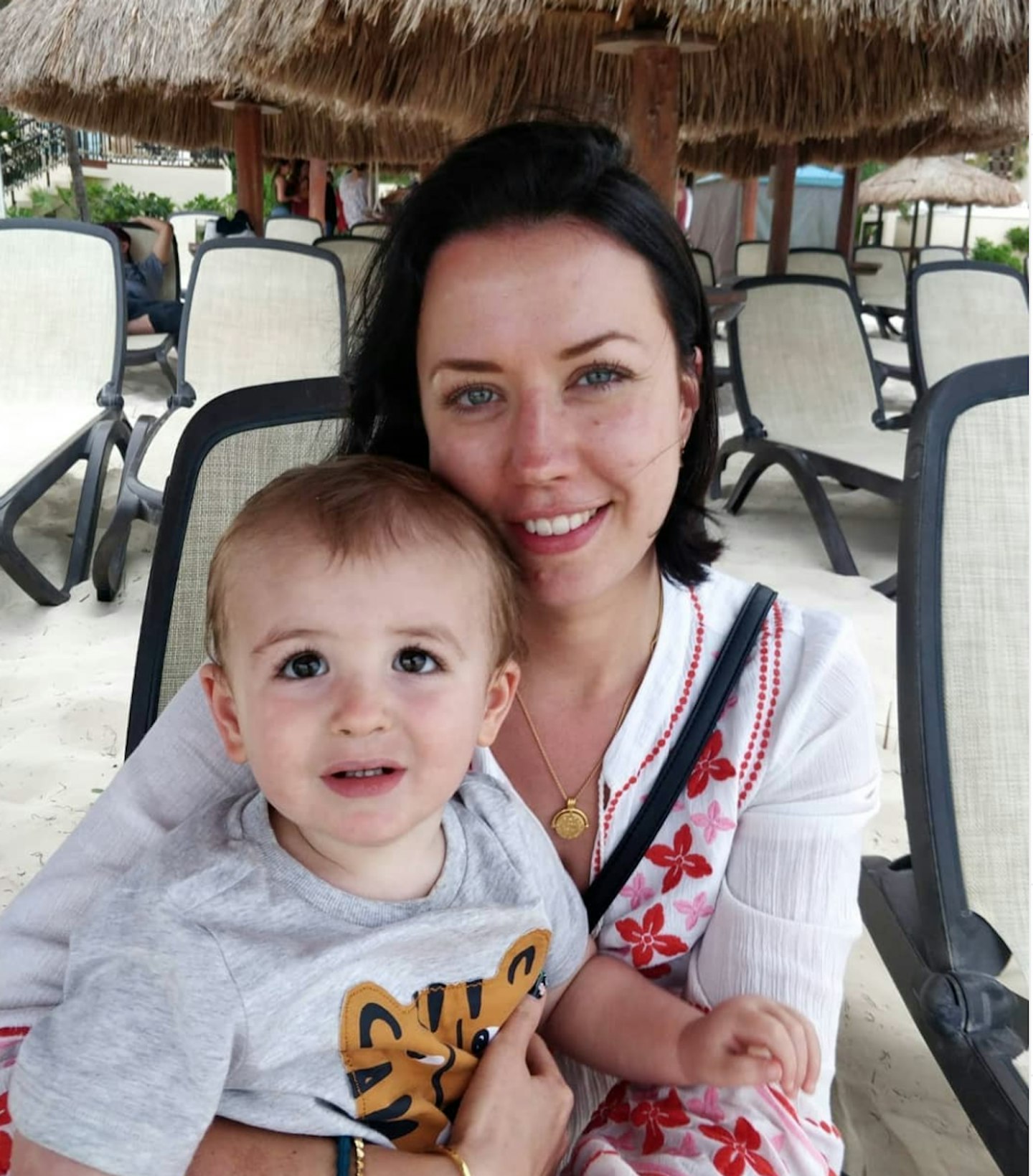Trigger warning. This article includes information about unwanted, intrusive thoughts of harm about the baby. Please take care when reading.
I first started to experience intrusive thoughts during a stressful pregnancy. After two years of trying unsuccessfully for a baby, my husband and I had been referred for IVF. Thankfully, after one pretty smooth round of treatment, I was pregnant. But just hours after I had watched those two blue lines creep across the test window, doubt, fear and anxiety had started to creep into my conscious.
I started Googling the risk of miscarriage, ectopic pregnancy and still birth. I would leave frantic voicemails to the care team at my fertility clinic after every strange sensation, and I became adamant that something was going to go wrong. Next came a bleed in early pregnancy and a scare at my 20-week scan where we were told there was a chance that there was something wrong with our baby’s brain: a small risk of disability. It terrified me and sent me down a rabbit hole of dark thoughts for weeks.
Thankfully, those scares were unfounded and my baby boy was born in good health on one of the hottest days of the summer in 2018. I finally felt relief. At last, I could take control and enjoy my longed for baby without any more medical interference.
But then, out of nowhere, I started to experience some very unwanted and scary thoughts. I’m not sure if it was the trauma and stress of my pregnancy coming back to haunt me, or the terrifying realisation that I was now in charge of keeping this beautiful baby, who I loved more than anything or anyone, safe and well.
Walking down the road felt like I was gambling with danger. I was terrified that a car would plough into us, and I would envision graphic images of a car smashing into the pram. Every night, as I prepared to go to sleep, I’d go through everything that had happened that day, and how I may have accidentally put my son in danger. Did I strap him in tight enough in the car? Should I have taken the pram rather than carried him to playgroup? What if I had fallen?
Most exhaustingly, I struggled to trust anyone else with my son. I hated other people holding him, as sociable as I was, and I remember being so desperate to snatch him back, I’d sit sweating and uncomfortable until he was safely back in my arms.

Over time, I found that these thoughts seemed to abate. My son started nursery and I learned to trust someone other than my mum to care of him. That was until just a few months ago when my son turned two. We tried again for a second baby – again with the help of IVF – but sadly I miscarried very early on. It was as though the sadness and disappointment of that loss, triggered something inside me. The intrusive thoughts reared their ugly head again, but in an even more intense way.
I lay in bed – the time when I experienced the thoughts most intensely - disgusted at myself for being so morbid. I would envision car crashes, my son falling from a slide, him drowning, or being cracked on the head by a falling brick. I was so angry with myself for thinking these things, and I would smack my forehead in an attempt to snap myself out of it. How could I keep him safe when the world was so full of danger?
It felt too revealing to confide in family or my husband so I found Dr Caroline Boyd (@_drboyd) online, a registered clinical psychologist and mother who specialises in intrusive thoughts in motherhood.
Through regular appointments with Caroline, I have worked through my feelings and fears over the past few months. She explained just how common intrusive thoughts were in new mothers and that it didn’t mean that I was on the verge of crisis as I had initially feared. It also allowed me to learn more about why intrusive thoughts happen in the first place, and how I could develop tactics to manage them and lessen their power. I asked Caroline to talk me through why many women find them difficult to talk about.
“One of the reasons this experience is really upsetting is because it is taboo and is just not talked about,” explains Caroline. “Women feel high shame, guilt, or horror when they have these thoughts. We describe them as being ego-dystonic which basically means they just don't sit comfortably with women and they clash with a woman’s sense of self”.
I think it's really helpful to understand that these thoughts can occur as part of the adjustment to having a baby
Intrusive, or harm thoughts, may occur in the form of word thoughts (e.g. such as “my baby is not safe” or “my baby might die”), images (e.g. a mental picture of the baby falling down the stairs), or impulses or urges (e.g. the urge to smack, shake or throw the baby).
In fact, these thoughts she explains, are believed by psychologists to be a natural way of new mothers learning how to love and protect their baby. “I think it's really helpful to understand that these thoughts can occur as part of the adjustment to having a baby,” says Caroline. “They are a way of adapting to the huge responsibility of caring for this tiny, defenceless, precious baby”.
“My research and clinical work shows that harm thoughts make women more conscious of their power, in contrast with the baby’s vulnerability. “Harm thoughts”, she continues, “are an adaptive response; a bit like an effective warning system, helping mums become more vigilant and work out clear lines between what is morally acceptable and what is not. There is also evidence to show that there are significant brain and hormone-related changes in pregnancy and in motherhood which last for at least two years postpartum”.
These changes are also what’s thought to be responsible for helping mothers to meet their baby’s needs – from empathising, to regulating their response and perceiving threat. In essence, they help us to become fierce protectors who focus primarily on our baby’s survival.
And while understanding intrusive thoughts can help to shift some of the burden, finding long and short term coping strategies is also essential. For me, this comes from regular therapy, talking about my fears with friends, daily meditation, and finding coping strategies to help me manage scary feelings. All of which I have learned through my therapy sessions with Caroline and are recommended ways of coping.
“Understanding what’s going on in your brain and body is helpful,” Caroline explains. “Try to find ways to separate yourself from the thought. When we go into threat mode and have an intrusive thought, our emotional brain takes over. So we’re hijacked by our emotional brain and our thinking brain goes offline. We want to try to calm and soothe the emotional part of our brain and to find ways to bring our thinking brain back online again”.
If you’re struggling in the moment, Caroline suggests noticing and naming how you are feeling. Ask yourself, ‘how am I feeling?’, ‘where am I feeling it in my body?’ and then name it. You could say, ‘I’m feeling really scared or anxious AND I am safe’. This dual focus of naming your feelings and reminding yourself that you’re safe is a way of dampening down the emotional arousal.
I’m now currently nearly 15 weeks pregnant, and thankfully feeling so much calmer this time around thanks to the help I’ve received over the past year. My hope is for other mothers who feel like me to seek the help they need, and most importantly know that they aren’t alone.
Useful links if you're having intrusive thoughts
FREE Pandas UK Helpline (call between 11am - 10pm): 0808 1961 776 http://www.pandasfoundation.org.uk/
Samaritans 24/7 Helpline: 116 123
In an emergency, please visit A&E
